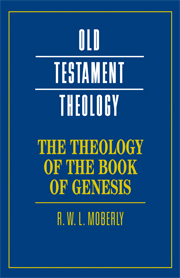Book contents
- Frontmatter
- Contents
- General Editors' Preface
- Preface
- List of Abbreviations
- 1 WHAT IS A “THEOLOGY OF GENESIS”?
- 2 ON READING GENESIS 1–11
- 3 GENESIS 1: PICTURING THE WORLD
- 4 GENESIS 2–3: ADAM AND EVE AND “THE FALL”
- 5 GENESIS 4: CAIN AND ABEL
- 6 GENESIS 6–9: CATACLYSM AND GRACE
- 7 ON READING GENESIS 12–50
- 8 GENESIS 12:1–3: A KEY TO INTERPRETING THE OLD TESTAMENT?
- 9 GENESIS 12:3A: A BIBLICAL BASIS FOR CHRISTIAN ZIONISM?
- 10 GENESIS 22: ABRAHAM – MODEL OR MONSTER?
- 11 ABRAHAM AND THE “ABRAHAMIC FAITHS”
- 12 GENESIS 37–50: IS JOSEPH WISE?
- Further Reading
- Author Index
- Scripture Index
- Subject Index
1 - WHAT IS A “THEOLOGY OF GENESIS”?
Published online by Cambridge University Press: 05 June 2012
- Frontmatter
- Contents
- General Editors' Preface
- Preface
- List of Abbreviations
- 1 WHAT IS A “THEOLOGY OF GENESIS”?
- 2 ON READING GENESIS 1–11
- 3 GENESIS 1: PICTURING THE WORLD
- 4 GENESIS 2–3: ADAM AND EVE AND “THE FALL”
- 5 GENESIS 4: CAIN AND ABEL
- 6 GENESIS 6–9: CATACLYSM AND GRACE
- 7 ON READING GENESIS 12–50
- 8 GENESIS 12:1–3: A KEY TO INTERPRETING THE OLD TESTAMENT?
- 9 GENESIS 12:3A: A BIBLICAL BASIS FOR CHRISTIAN ZIONISM?
- 10 GENESIS 22: ABRAHAM – MODEL OR MONSTER?
- 11 ABRAHAM AND THE “ABRAHAMIC FAITHS”
- 12 GENESIS 37–50: IS JOSEPH WISE?
- Further Reading
- Author Index
- Scripture Index
- Subject Index
Summary
The book of Genesis contains some of the most memorable and moving narratives within the Old Testament, which have engaged the hearts and minds of (quite literally) millions of people down the ages. Neither Jewish nor Christian faiths – nor, more distantly, Islam – can be understood without some appreciation of the enduring impact of the Book of Genesis. Likewise, much of the literature and art of Western civilization, at least until recent times, is deeply imbued with motifs and images from Genesis.
In Genesis, God creates a world, which is the object of his approval, indeed delight (“very good”). Yet Eve and Adam listen to the serpent in Eden and eat the forbidden fruit, hide from God, and are expelled from Eden. Cain resents God's preferential acceptance of Abel's sacrifice, ignores God's warning,murders Abel, and is condemned by God to be a marked and restless wanderer on the earth.Noah builds an ark in wordless obedience to God and enables a faithful remnant to live through the unmaking and remaking of the known world. The great building project at Babel – Babylon, an early center of human enterprise – is overturned by God so as to scatter people and make human language and culture complex. Against His backdrop Abraham is called by God to leave his Mesopotamian home on the basis of God's promise to make him the ancestor of a great people, in a land of their own, blessed by God, and esteemed by other peoples.
- Type
- Chapter
- Information
- The Theology of the Book of Genesis , pp. 1 - 20Publisher: Cambridge University PressPrint publication year: 2009



